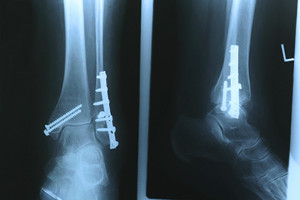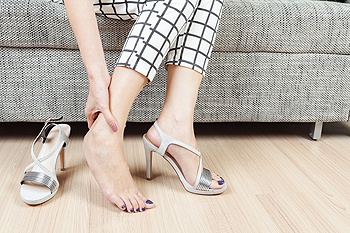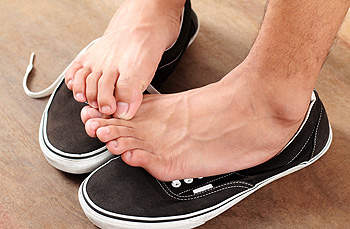Connect With Us
Blog
Items filtered by date: April 2021
Keep Your Feet Healthy So You Can Stay Active
Can Hammertoe Be Cured?
 Hammertoe is a foot condition that is considered to be a deformity. It can cause the toes to curl and remain in a downward position. This condition often develops because of genetic factors, or from wearing shoes that do not have adequate room for the toes to move freely in. A muscle imbalance is often responsible for the abnormal position of the toes and can gradually worsen. Patients have found mild relief when orthotics or shoe inserts are worn, and it may help to prevent this ailment when shoes that are worn fit correctly. If you have developed hammertoe, it is suggested that you speak with a podiatrist who can offer you correct treatment techniques. In severe cases, surgery may be necessary to permanently straighten the toes.
Hammertoe is a foot condition that is considered to be a deformity. It can cause the toes to curl and remain in a downward position. This condition often develops because of genetic factors, or from wearing shoes that do not have adequate room for the toes to move freely in. A muscle imbalance is often responsible for the abnormal position of the toes and can gradually worsen. Patients have found mild relief when orthotics or shoe inserts are worn, and it may help to prevent this ailment when shoes that are worn fit correctly. If you have developed hammertoe, it is suggested that you speak with a podiatrist who can offer you correct treatment techniques. In severe cases, surgery may be necessary to permanently straighten the toes.
Hammertoe
Hammertoes can be a painful condition to live with. For more information, contact Vivian C. Iwu, DPM from Choice Podiatry Center. Our doctor will answer any of your foot- and ankle-related questions.
Hammertoe is a foot deformity that affects the joints of the second, third, fourth, or fifth toes of your feet. It is a painful foot condition in which these toes curl and arch up, which can often lead to pain when wearing footwear.
Symptoms
- Pain in the affected toes
- Development of corns or calluses due to friction
- Inflammation
- Redness
- Contracture of the toes
Causes
Genetics – People who are genetically predisposed to hammertoe are often more susceptible
Arthritis – Because arthritis affects the joints in your toes, further deformities stemming from arthritis can occur
Trauma – Direct trauma to the toes could potentially lead to hammertoe
Ill-fitting shoes – Undue pressure on the front of the toes from ill-fitting shoes can potentially lead to the development of hammertoe
Treatment
Orthotics – Custom made inserts can be used to help relieve pressure placed on the toes and therefore relieve some of the pain associated with it
Medications – Oral medications such as anti-inflammatories or NSAIDs could be used to treat the pain and inflammation hammertoes causes. Injections of corticosteroids are also sometimes used
Surgery – In more severe cases where the hammertoes have become more rigid, foot surgery is a potential option
If you have any questions please contact our office located in Marietta, GA . We offer the newest diagnostic and treatment technologies for all your foot and ankle needs.
What Causes a Stress Fracture to Occur?
Str ess fractures occur over time, with a moderate amount of pressure being applied to a bone which eventually can cause it to break without dislocating it—as is often the case with a sudden traumatic bone fracture. Because the feet and ankles bear the weight of our bodies every day, stress fractures in these areas are not unusual. The repetitive movements of everyday activities such as running, standing and walking apply steady force which can weaken the bone. This causes a stress reaction which may lead to the bone eventually breaking. Stress fractures typically occur in either athletes who can wear out their feet and ankles through overuse, and people with insufficient density in their bones due to conditions such as osteoporosis. However, having a bunion which can shift weight distribution, wearing high heels, starting a new high impact activity, or increasing the intensity and frequency of workouts suddenly can also increase the likelihood of a stress fracture. If you are experiencing any weakness or fatigue in your ankles, it is suggested that you contact a podiatrist who can help you maintain optimal foot and ankle health.
ess fractures occur over time, with a moderate amount of pressure being applied to a bone which eventually can cause it to break without dislocating it—as is often the case with a sudden traumatic bone fracture. Because the feet and ankles bear the weight of our bodies every day, stress fractures in these areas are not unusual. The repetitive movements of everyday activities such as running, standing and walking apply steady force which can weaken the bone. This causes a stress reaction which may lead to the bone eventually breaking. Stress fractures typically occur in either athletes who can wear out their feet and ankles through overuse, and people with insufficient density in their bones due to conditions such as osteoporosis. However, having a bunion which can shift weight distribution, wearing high heels, starting a new high impact activity, or increasing the intensity and frequency of workouts suddenly can also increase the likelihood of a stress fracture. If you are experiencing any weakness or fatigue in your ankles, it is suggested that you contact a podiatrist who can help you maintain optimal foot and ankle health.
Activities where too much pressure is put on the feet can cause stress fractures. To learn more, contact Vivian C. Iwu, DPM from Choice Podiatry Center. Our doctor can provide the care you need to keep your pain free and on your feet.
Dealing with Stress Fractures of the Foot and Ankle
Stress fractures occur in the foot and ankle when muscles in these areas weaken from too much or too little use. The feet and ankles then lose support when walking or running from the impact of the ground. Since there is no protection, the bones receive the full impact of each step. Stress on the feet can cause cracks to form in the bones, thus creating stress fractures.
What Are Stress Fractures?
Stress fractures occur frequently in individuals whose daily activities cause great impact on the feet and ankles. Stress factors are most common among:
- Runners
- People affected with Osteoporosis
- Tennis or basketball players
- Gymnasts
- High impact workouts
Symptoms
Pain from the fractures occur in the area of the fractures and can be constant or intermittent. It will often cause sharp or dull pain with swelling and tenderness. Engaging in any kind of activity which involves high impact will aggravate pain.
If you have any questions please feel free to contact our office located in Marietta, GA . We offer the newest diagnostic and treatment technologies for all your foot and ankle needs.
Read more about Dealing with Stress Fractures of the Foot and AnkleAnkle Joints, The Achilles Tendon, and High Heels
 The ankles may suffer for women who choose to frequently wear high heels. This can be a result of the amount of body weight the ankle joints bear, and is generally increased when high heels are worn. Research has shown that arthritis may develop in women who enjoy wearing high heels, which can cause severe pain and discomfort. Additionally, the Achilles tendon can be affected. This is the tendon that is located in the back of the leg, and connects the calf muscles to the heel. Consistent wearing of high heels, can make this tendon feel stiff. If you would like additional information about the effect high heels have on the feet, please confer with a podiatrist.
The ankles may suffer for women who choose to frequently wear high heels. This can be a result of the amount of body weight the ankle joints bear, and is generally increased when high heels are worn. Research has shown that arthritis may develop in women who enjoy wearing high heels, which can cause severe pain and discomfort. Additionally, the Achilles tendon can be affected. This is the tendon that is located in the back of the leg, and connects the calf muscles to the heel. Consistent wearing of high heels, can make this tendon feel stiff. If you would like additional information about the effect high heels have on the feet, please confer with a podiatrist.
High heels have a history of causing foot and ankle problems. If you have any concerns about your feet or ankles, contact Vivian C. Iwu, DPM from Choice Podiatry Center. Our doctor can provide the care you need to keep you pain-free and on your feet.
Effects of High Heels on the Feet
High heels are popular shoes among women because of their many styles and societal appeal. Despite this, high heels can still cause many health problems if worn too frequently.
Which Parts of My Body Will Be Affected by High Heels?
- Ankle Joints
- Achilles Tendon – May shorten and stiffen with prolonged wear
- Balls of the Feet
- Knees – Heels cause the knees to bend constantly, creating stress on them
- Back – They decrease the spine’s ability to absorb shock, which may lead to back pain. The vertebrae of the lower back may compress.
What Kinds of Foot Problems Can Develop from Wearing High Heels?
- Corns
- Calluses
- Hammertoe
- Bunions
- Morton’s Neuroma
- Plantar Fasciitis
How Can I Still Wear High Heels and Maintain Foot Health?
If you want to wear high heeled shoes, make sure that you are not wearing them every day, as this will help prevent long term physical problems. Try wearing thicker heels as opposed to stilettos to distribute weight more evenly across the feet. Always make sure you are wearing the proper shoes for the right occasion, such as sneakers for exercising. If you walk to work, try carrying your heels with you and changing into them once you arrive at work. Adding inserts to your heels can help cushion your feet and absorb shock. Full foot inserts or metatarsal pads are available.
If you have any questions please feel free to contact our office located in Marietta, GA . We offer the newest diagnostic and treatment technologies for all your foot and ankle needs.
Is There a Cure for My Sweaty Feet?
With over 125,000 sweat glands in the feet, it’s no wonder that everyone’s feet sweat occasionally. However, if you experience persistently slimy feet and struggle to keep them dry throughout the day, you may have plantar hyperhidrosis. This unpleasant and uncomfortable condition can also cause other embarrassing problems like foot odor and toenail fungus. You can try to manage plantar hyperhidrosis by washing your feet often, wearing cotton or moisture-absorbing socks, soaking your feet in black tea, applying anti-fungal powders or antiperspirant, and staying hydrated. If these home remedies don’t offer relief, you may consider contacting a podiatrist who can offer an array of medical treatments and procedures to help your condition.
If you are suffering from hyperhidrosis contact Vivian C. Iwu, DPM of Choice Podiatry Center. Our doctor can provide the care you need to attend to all of your foot and ankle needs.
Hyperhidrosis of the Feet
Hyperhidrosis is a rare disorder that can cause people to have excessive sweating of their feet. This can usually occur all on its own without rigorous activity involved. People who suffer from hyperhidrosis may also experience sweaty palms.
Although it is said that sweating is a healthy process meant to cool down the body temperature and to maintain a proper internal temperature, hyperhidrosis may prove to be a huge hindrance on a person’s everyday life.
Plantar hyperhidrosis is considered to be the main form of hyperhidrosis. Secondary hyperhidrosis can refer to sweating that occurs in areas other than the feet or hands and armpits. Often this may be a sign of it being related to another medical condition such as menopause, hyperthyroidism and even Parkinson’s disease.
In order to alleviate this condition, it is important to see your doctor so that they may prescribe the necessary medications so that you can begin to live a normal life again. If this is left untreated, it is said that it will persist throughout an individual’s life.
A last resort approach would be surgery, but it is best to speak with your doctor to find out what may be the best treatment for you.
If you have any questions please feel free to contact our office located in Marietta, GA . We offer the newest diagnostic and treatment technologies for all your foot and ankle needs.



